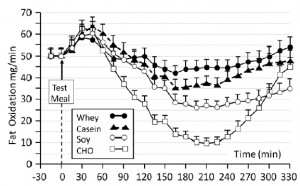 By Isagenix Nutritional Sciences
By Isagenix Nutritional Sciences
When it comes to stimulating thermogenesis and satisfying appetite, it’s well known that dietary protein is king over carbohydrates and fats. Now, a new study confirms that and goes even further and shows what protein source you choose matters, too!
According to new research from the Nestle Research Center in Switzerland, whey protein consumed at breakfast, lunch and dinner proved most successful than either casein or soy proteins for boosting fat burning and simultaneously reducing muscle loss.
“The present findings confirm that protein-rich test meals have a greater thermic effect than that of carbohydrate and extend these results by showing that whey protein elicits a greater thermic response than does protein composed of either casein or soy,” the scientists report in the March issue of The American Journal of Clinical Nutrition.
The scientists conducted a double-blinded, randomized, placebo-controlled study, measuring the thermic effect of meals high in whey, casein or soy proteins, with a high carbohydrate meal as a control. They found that the total energy expenditure over 5.5 hours was greater after consuming the whey protein meal versus the other proteins and all were significantly higher than the high-carbohydrate meal (see Figure).
The thermic effect of food is a measurement of the amount of energy that is required for digestion and absorption and metabolism. Put simply, the act of eating and digesting both brings in calories and burns them. Eating foods with a higher thermic effect can support weight management goals and, in the case of whey protein, even promote muscle growth.
More than just a metabolic measure, the thermic effect of foods reflects the rate that fats, proteins and carbohydrates are broken down for energy in our bodies. The researchers explained the high thermic effect of whey protein might be due to the amino acid composition. Whey is high in leucine, a branched-chain amino acid, which has been shown to stimulate muscle protein synthesis, and muscle turnover.
The study tested the metabolic rate, satiety and glucose control of 23 lean, healthy individuals following one of the meal options. Subjects were tested in a metabolic chamber measuring their basal (resting) energy expenditure. Researchers monitored the subjects for five hours to measure postprandial (after-eating) energy expenditure. All meals contained an equivalent amount of calories.
In addition to boosting fat burning potential, a protein-rich diet also resulted in a much lower postprandial glucose response than the carbohydrate control. “Whey supplements have been proposed to increase synthesis, and in the presence of increased insulin secretion, one would expect its anabolic effects to favor increased lean body mass.”
The authors proposed that increased protein synthesis is “one possible mechanism responsible for the increased thermogenesis observed after high-protein than after high-carbohydrate diets, and the rate of protein synthesis has been observed to be more rapid, two-fold greater, after the consumption of whey than after that of casein.”
On the other hand, according to the researchers, casein or soy proteins may provide greater feelings of satiety (based on subjective questionnaires) and may be more effective for blood glucose control because of a slower rate of emptying from the stomach.
Reference: Acheson KJ. Protein choices targeting thermogenesis and metabolism. Am J Clin Nutr 2011; 93: 525-34. doi: 10.3945/ajcn.110.005850
Editor’s note: Isagenix uses New Zealand-sourced whey and other dairy proteins including casein in IsaLean Shake to take advantage of both fast- and slow-digesting properties to maximize muscle retention through sustained blood amino acid levels, increase thermogenesis, promote satiety, and encourage healthy weight management.











